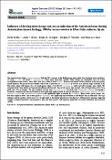Por favor, use este identificador para citar o enlazar a este item:
http://hdl.handle.net/10261/125038COMPARTIR / EXPORTAR:
 SHARE SHARE
 CORE
BASE CORE
BASE
|
|
| Visualizar otros formatos: MARC | Dublin Core | RDF | ORE | MODS | METS | DIDL | DATACITE | |

| Título: | Influence of developmental stage and sex on infection of the American brine shrimp Artemia franciscana Kellogg, 1906 by avian cestodes in Ebro Delta salterns, Spain |
Autor: | Redón, Stella CSIC ORCID; Green, Andy J. CSIC ORCID ; Boyko B. Georgiev; Gergana P. Vasileva; Amat, Francisco CSIC | Palabras clave: | Host-parasite interactions Helminth larvae Intrinsic factors Age Invasion process |
Fecha de publicación: | 2015 | Editor: | Regional Euro-Asian Biological Invasions Centre | Citación: | Aquatic Invasions (2015) 10(4): 415–423 | Resumen: | The American brine shrimp Artemia franciscana Kellogg, 1906 is invasive in the Mediterranean region where it has displaced native populations of sexual A. salina and clonal A. parthenogenetica from many hypersaline wetlands. Brine shrimps are intermediate hosts of several cyclophyllidean avian cestodes, whose effects have been studied in native Artemia. However, determinants of these infections in the alien invader remain unknown. We present the most detailed study to date of parasitism of A. franciscana by cestodes in its invasive range, conducted in the Ebro Delta salterns (NE Spain) over a 33 month period, when a total of 9,293 A. franciscana adults and 8,902 juveniles were studied. We examined for first time whether host age and sex influence infection rates. Ten cestode species were recorded, with a total prevalence of 11.1% in adults and 2.7% in juveniles. The most abundant cestodes were Eurycestus avoceti (in adults) and Flamingolepis flamingo (in juveniles). Prevalence, abundance and intensity of infection were significantly higher in adults for four cestode species (Flamingolepis liguloides, Wardium stellorae, E. avoceti and Anomotaenia microphallos), and significantly higher in juveniles for F. flamingo. Mean cestode species richness was four times higher in adults. One cestode species (F. liguloides), was significantly more abundant in adult females than in adult males. Host age influences infection patterns which seem to be strongly related to the feeding behaviour of avian final hosts (filtering versus picking), suggesting complex ecological interactions among predators, prey and their parasites, with important implications for native biodiversity and ecosystem stability. | Versión del editor: | http://dx.doi.org/10.3391/ai.2015.10.4.05 | URI: | http://hdl.handle.net/10261/125038 | DOI: | 10.3391/ai.2015.10.4.05 |
| Aparece en las colecciones: | (EBD) Artículos |
Ficheros en este ítem:
| Fichero | Descripción | Tamaño | Formato | |
|---|---|---|---|---|
| AI_2015_Redon_etal.pdf | 784,79 kB | Adobe PDF |  Visualizar/Abrir |
CORE Recommender
SCOPUSTM
Citations
10
checked on 24-abr-2024
WEB OF SCIENCETM
Citations
7
checked on 22-feb-2024
Page view(s)
296
checked on 21-abr-2024
Download(s)
301
checked on 21-abr-2024
Google ScholarTM
Check
Altmetric
Altmetric
NOTA: Los ítems de Digital.CSIC están protegidos por copyright, con todos los derechos reservados, a menos que se indique lo contrario.
